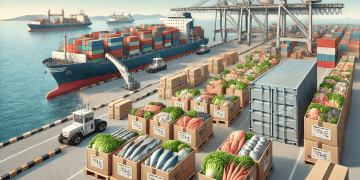SupplyChainReport has learned of new regulatory requirements impacting businesses exporting seafood to Taiwan. Effective immediately, Taiwan’s Food and Drug Administration (TFDA) has implemented stringent guidelines aimed at enhancing food safety and regulatory compliance in imported seafood products. These measures signify a significant shift in Taiwan’s approach to safeguarding public health and consumer interests.
Under the revised regulations, seafood exporters must adhere to comprehensive documentation and certification procedures to ensure compliance with Taiwan’s stringent food safety standards. These include providing detailed product information, proof of origin, and adherence to specific labeling requirements.
The TFDA’s updated guidelines mandate that all imported seafood shipments undergo rigorous inspection and testing upon arrival in Taiwan. This includes scrutiny for contaminants, microbiological risks, and adherence to permissible residue levels of veterinary drugs and pesticides. Furthermore, exporters must demonstrate adherence to Taiwan’s maximum residue limits (MRLs) for chemical contaminants and ensure that seafood products meet local safety standards.
In response to these new requirements, businesses exporting seafood to Taiwan are advised to review and update their export protocols accordingly. Compliance with these regulations is crucial to maintaining market access and ensuring consumer confidence in Taiwanese markets.
For more detailed information on Taiwan’s new seafood export requirements, please visit the TFDA’s official website or consult with regulatory experts familiar with Taiwanese import regulations. Stay tuned to SupplyChainReport for further updates on international trade regulations and their impact on global supply chains.
Get the latest supply chain report news at The Supply Chain Report. Learn more about international trade with tools from ADAMftd.com.
#SeafoodExport #TaiwanRegulations #FoodSafety #TFDA #ImportCompliance #SeafoodIndustry #ExportProtocol #MarketAccess #ConsumerConfidence #GlobalSupplyChain #TradeRegulations #FoodImport #SafetyStandards #ResidueLimits #SeafoodInspection















